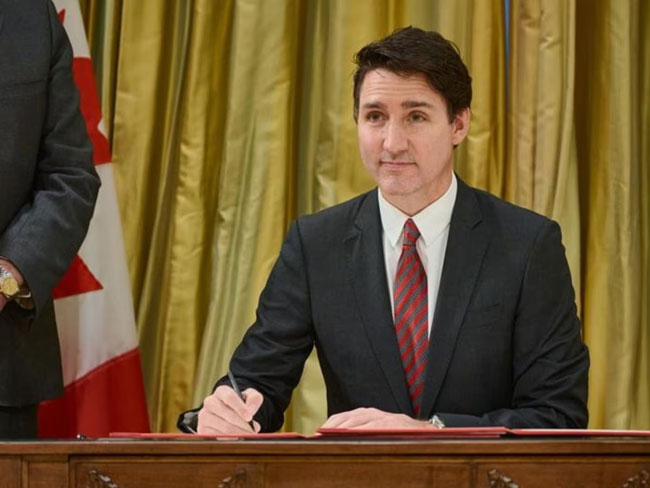Ottawa:Justin Trudeau announced his resignation as the leader of the Liberal Party of Canada, effectively ending his nine-year tenure as Prime Minister. Speaking outside Rideau Cottage in Ottawa, Trudeau revealed he would continue as a caretaker prime minister until his successor is chosen through a nationwide process.
“I have informed my party and the Governor that I intend to resign as leader of the party as well as Prime Minister of Canada, effective upon the appointment of my successor,” said Trudeau, 53, addressing the media in both English and French.
Trudeau cited a “paralyzed parliament” as a key reason for his decision, adding, “I am a fighter, but I believe the time has come for new leadership to guide the party and the country.” He also announced the prorogation of Parliament until March 24 to facilitate the leadership transition.
Calls for Electoral Reform and Regrets
Reflecting on his time in office, Trudeau expressed regret over failing to reform Canada’s electoral system, stating, “I wish we had implemented a system where voters could rank their choices to avoid polarisation and foster unity.”
Potential Successors
Several prominent Liberal Party figures are being considered as Trudeau’s replacement:
- Dominic LeBlanc, Minister of Intergovernmental Affairs and Finance.
- Melanie Joly, Foreign Affairs Minister representing Montreal.
- Francois-Philippe Champagne, Minister of Innovation, Science, and Industry.
- Mark Carney, former Governor of the Bank of Canada and Bank of England.
Rebellion Within the Liberal Party
Trudeau’s leadership faced growing criticism within the Liberal Party in recent months. Opinion polls showed a surge in support for the opposition Conservative Party, while senior party members, including Sean Casey and Chandra Arya, publicly called for Trudeau’s resignation.
The tipping point came in December 2024, when Chrystia Freeland, Trudeau’s Deputy Prime Minister and Finance Minister, resigned over policy disagreements, accusing him of prioritizing “political gimmicks” over effective governance.
Economic and Diplomatic Challenges
Trudeau’s tenure was marked by economic struggles, including high inflation, sluggish growth, and threats of U.S. tariffs under Donald Trump’s administration. The Canadian dollar, which had been declining, rebounded following his resignation announcement.
On the international stage, Trudeau faced criticism for strained relations with India. His accusations of Indian involvement in the killing of Khalistani extremist Hardeep Singh Nijjar in Canada led to diplomatic fallout, including the expulsion of diplomats and a suspension of trade talks. Critics accused Trudeau of pandering to Khalistani sympathisers for political gain.
A Parting Shot at the Opposition
Trudeau took aim at opposition leader Pierre Poilievre in his resignation speech, criticizing his stance on climate change and diversity. “Pierre Poilievre’s vision for Canada is not the right one. We need ambition and optimism, not regression,” Trudeau said.
What’s Next?
Canada’s Liberal Party has 90 days to select a new leader, who will also serve as the interim prime minister until the general elections later this year. Trudeau’s departure marks a turning point in Canadian politics, as the nation grapples with the challenges of economic recovery and geopolitical tensions.
The Liberal Party is now preparing for a leadership race that could reshape its future as Canada moves toward its next chapter under new leadership.




